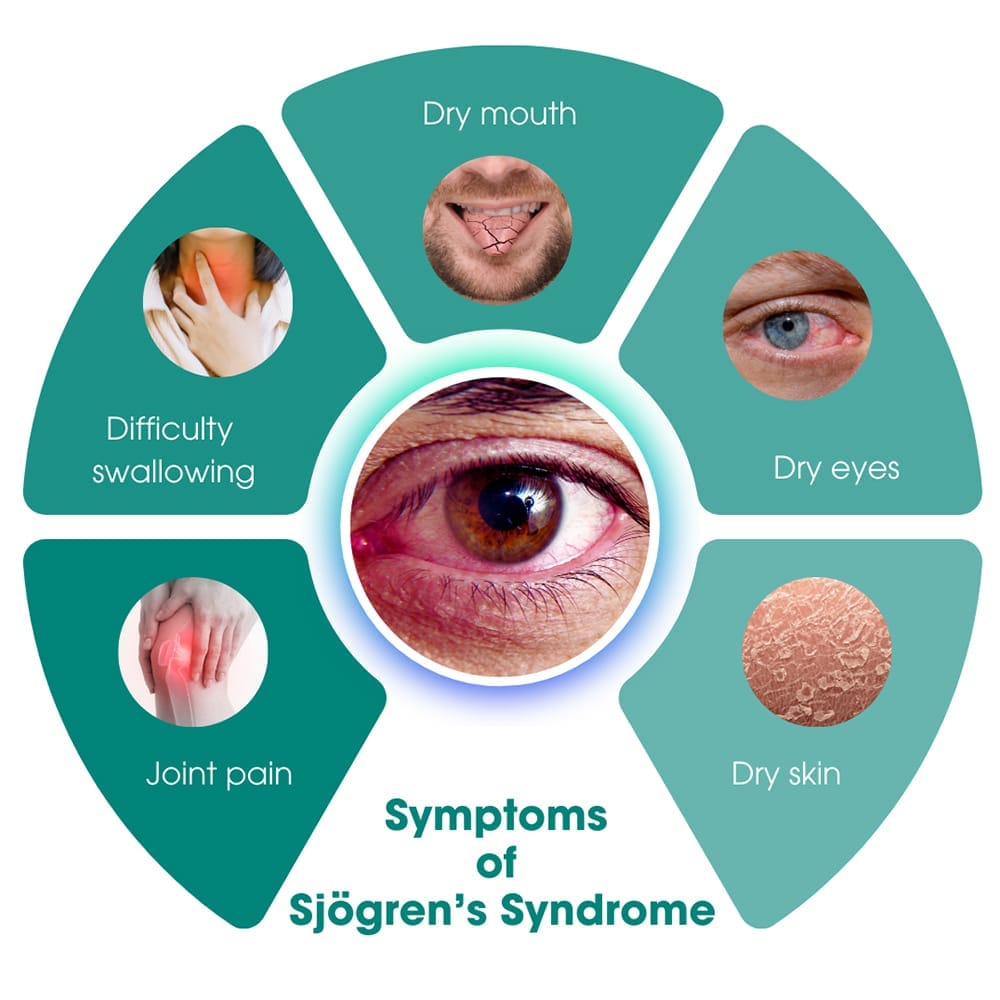Sjögren’s syndrome is a chronic autoimmune disorder that largely impairs the body’s ability to create moisture, resulting in widespread dryness. This syndrome, named after Swedish ophthalmologist Henrik Sjögren, who first characterized it in the early twentieth century, can occur independently or along with other symptoms that may appear in different places in your body.
Sjögren’s syndrome, pronounced “showgrin,” is less prevalent than other autoimmune diseases, yet it’s not rare, as it affects nearly four percent of the world’s population. There is no cure for Sjögren’s syndrome, although there are numerous Sjögren’s syndrome treatments and management options.
Sjögren’s syndrome classifies into two categories:
If have dry eyes and are seeking a Sjögren’s specialist in Downtown Manhattan for a definitive diagnosis, Eye Physicians in NYC can update you with all the Sjögren’s syndrome treatment options that are available. Their optometrists have a wealth of expertise in diagnosing and treating both rare and common eye disorders.
Sjögren’s syndrome presents with varied effects on the body, and the symptoms vary from person to person. Few people have all the symptoms, and most of the time, symptoms fluctuate between mild and severe.
Common symptoms include:
Secondary symptoms of Sjögren’s syndrome differ according to the organs and systems impacted by the autoimmune response to the condition.
The secondary symptoms may include:
If left untreated, Sjögren’s disease can cause a variety of problems that impact different organs and systems.
Symptoms are present in addition to the signs and symptoms of your underlying disease and may include:

When seeking effective ways to manage your health and understand complex autoimmune conditions, finding an expert in every aspect of Sjögren’s Syndrome care is essential.
Locate a Sjögren’s syndrome specialist who not only helps you manage symptoms but also supports you in planning long-term health strategies using advanced diagnostic tools and treatments to maintain comfort and quality of life. Licensed specialists at Eye Physicians offer a wide range of personalized and comprehensive services in autoimmune disorder management and patient education to promote symptom relief and improve daily function. They are ready to assist you with developing a care plan, conducting regular health assessments, addressing symptom management, and providing nutritional and lifestyle guidance.
The actual cause of Sjögren’s syndrome is unknown, but different factors are thought to contribute to its development. Sjögren’s syndrome is an autoimmune illness in which the immune system destroys normal tissues. Normally, the immune system defends the body against infection and disease.
Some factors that may contribute to the development of this condition include:
Diagnosing Sjögren’s syndrome is an extensive process. Your Sjögren’s syndrome specialist in Downtown Manhattan carefully analyzes medical histories, noting how long you’ve had symptoms such as dry eyes and lips, and performs extensive eye examinations. Test Objective studies, such as tear and saliva production measurements, as well as blood tests to detect specific antibodies, help with a diagnosis.
Sjögren’s syndrome has no cure, thus treatment focuses on symptom management and preventing complications. You must work closely with your Sjögren’s specialist to create a personalized treatment plan that’s suited to your unique symptoms and needs.
The general approach to treating these symptoms includes:
Wearing sunglasses and using humidifiers for dry eye relief, investigating biological treatments targeting immunological pathways and considering immunosuppressive medicines for severe symptoms are all potential treatment choices.
Lifestyle changes, such as quitting smoking and using air conditioning, are also important. Regular monitoring and follow-up with a doctor for Sjögren’s syndrome ensures that management schemes are adjusted to achieve maximum symptom control.
Eye Physicians in New York City provides exceptional Sjögren’s syndrome treatments at their Downtown Manhattan practice. With decades of experience, your doctor for Sjögren’s syndrome provides you with an accurate diagnosis and effective treatment for you and your family.
To prioritize your well-being, contact Eye Physicians in NYC at the first sign of visual discomfort. In addition to the best Sjögren’s syndrome treatment, the Eye Physician’s team offers service from pediatric eye doctors who know how to work with kids.
They offer comprehensive eye care that includes a wealth of treatment options for all kinds of eye problems, including:
At Eye Physicians, we are dedicated to providing comprehensive eye care for patients with Sjogren’s Syndrome, utilizing advanced diagnostic tools and personalized treatment plans to alleviate symptoms and improve quality of life. Our experienced team is committed to ongoing research and education to ensure that our patients receive the best possible care.
Eye Physicians
110 Lafayette St, Suite 503
New York, NY 10013
(212) 292-4814
Entrust the care of your precious eyesight to highly skilled and experienced eye care professionals. For top-notch ophthalmologists and optometrists in Downtown Manhattan, choose Eye Physicians. Eye Physicians ensures prompt care, precise diagnosis, and personalized treatment plans.
Schedule an Appointment